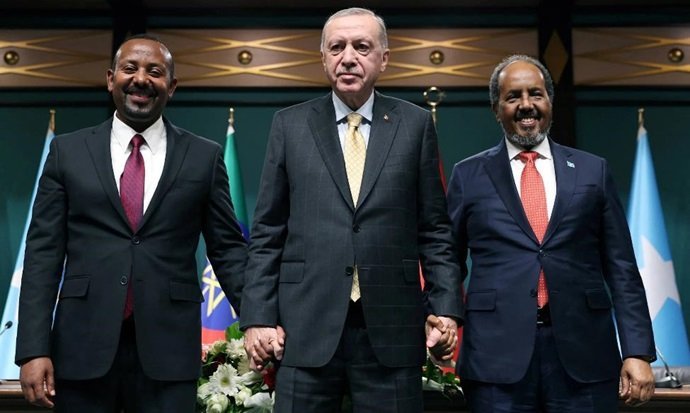By Ragip Soylu, Middle East Eye
When Somali President Hassan Sheikh Mohamud and Ethiopian Prime Minister Abiy Ahmed met in Ankara on Wednesday, expectations from their Turkish hosts were high.
The Turkish government had been attempting to mediate the sea port crisis between the two countries for almost a year through two rounds of negotiations, but no tangible progress had been made beyond vague statements of goodwill.

Mogadishu has been demanding that Ethiopia cancel a memorandum of understanding (MoU) it signed with Somalia’s breakaway northern region of Somaliland in January. This agreement aimed to grant Ethiopia port access through Somaliland’s coastline for the next 50 years.
Somalia viewed the MoU as a potential recognition of Somaliland as a sovereign state and threatened war to protect its territorial integrity. Ethiopia, in contrast, argued that as a landlocked country, it had a right to sea access under international law.
“You won’t leave this room until you reach a deal,” Turkish President Recep Tayyip Erdogan said during the negotiations, according to a person familiar with the issue speaking to Middle East Eye.
Erdogan, who has known both leaders for years, has invested heavily in Somalia since 2011. Turkey has established a military base in the country, trained thousands of Somali soldiers, managed Mogadishu’s airport and port, and provided extensive humanitarian and military aid.
In 2021, Erdogan’s decision to sell Turkish armed drones to Abiy tipped the balance of Ethiopia’s civil war against the Tigray forces in Abiy’s favour.
Sticking point
A Turkish official stated that the negotiations between the two leaders and their respective teams lasted nearly seven uninterrupted hours, with Erdogan and Turkish Foreign Minister Hakan Fidan actively participating.
According to a source familiar with the talks, one of the key sticking points was Ethiopia’s recognition of Somalia’s territorial unity. This recognition would effectively require Ethiopia to cancel its MoU with Somaliland.
The source added that while Abiy was willing to sign a statement committing to Somalia’s independence and sovereignty, he resisted any mention of “territorial integrity” or “unity”.
The Somali delegation countered by referencing the 1933 Montevideo Convention, which codifies international legal norms and principles regarding statehood. One of its key criteria for statehood is the possession of a “defined territory”.
“You cannot say you recognise a country but deny that it has a defined territory,” the source explained.
Turkish officials found this argument persuasive, concluding that Ethiopia must either recognise Somalia in its entirety under international law or not at all.
Hours of negotiations later, Somalia and Ethiopia finally reached a final agreement, known as the Ankara Declaration, that addressed the core demands of both. Somalia secured Ethiopia’s recognition of its territorial unity, while Ethiopia was granted commercial access to the Somali coastline.
The declaration also stipulated that technical delegations from both nations, facilitated by Turkey, would begin negotiations no later than February 2025, with a deadline to complete the talks within four months. Turkish officials hailed the deal as a victory for both sides.
Read more: Inside the Turkey-backed Somalia-Ethiopia deal
Source: Middle East Eye

Leave a Reply